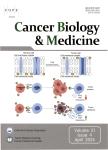Promoter methylation of Wnt/β-Catenin signal inhibitor TMEM88 is associated with unfavorable prognosis of nonsmall cell lung cancer
Promoter methylation of Wnt/β-Catenin signal inhibitor TMEM88 is associated with unfavorable prognosis of nonsmall cell lung cancer作者机构:Hongqiao International Institute of MedicineShanghai Tongren Hospital/Faculty of Public HealthShanghai Jiao Tong University School of Medicine Key Laboratory of Cancer Prevention and TherapyTianjin Medical University Cancer Institute and Hospital Cancer Epidemiology ProgramUniversity of Hawaii Cancer Center
出 版 物:《Cancer Biology & Medicine》 (癌症生物学与医学(英文版))
年 卷 期:2017年第14卷第4期
页 面:377-386页
核心收录:
学科分类:1002[医学-临床医学] 100214[医学-肿瘤学] 10[医学]
基 金:supported by the National Natural Science Foundation of China(Grant No.81573231) the Medical Professionals Crossing Project of Shanghai Jiao Tong University(Grant No.YG2015ZD01)
主 题:TMEM88 lung cancer methylation prognosis Wnt/β-Catenin signaling
摘 要:Objective:Recent research has indicated that altered promoter methylation of oncogenes and tumor suppressor genes is an important mechanism in lung cancer development and *** this study,we investigated the association between promoter methylation of TMEM88,a possible inhibitor of the Wnt/β-Catenin signaling,and the survival of patients with nonsmall cell lung cancer(NSCLC).Methods:Twelve pairs of tumor and adjacent non-tumor samples were used for microarray analyses of DNA methylation and gene *** validation,more than two hundred additional samples were analyzed for methylation using bisulfite pyrosequencing and for gene expression using q *** the cell function were tested by wound healing,transwell,CCK8 and cell cycle ***:Our analysis of patient specimens showed that TMEM88 methylation was higher in NSCLC tumors(82.2%±10.3,P56 months;P=0.021).In addition,we found that demethylation treatment could inhibit tumor cell proliferation,migration,and invasion,which was supportive of an association between methylation and ***:Based on these consistent observations,we concluded that TMEM88 may play an important role in NSCLC progression and that promoter methylation of TMEM88 may serve as a biomarker for NSCLC prognosis and treatment.



